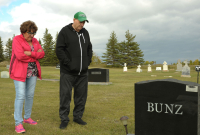Support strong Canadian climate journalism for 2025
Shortly before he died in November 2016, Leonard Cohen gave a press conference to discuss his new album, You Want it Darker. During the conference he spoke about the use he made in the album’s title song of the Hebrew word, hineni. This word which translates as “Here I am” or “I am ready” occurs on a handful of occasions in the Old Testament. Moses uses it when God speaks to him from out of the burning bush, and Abraham uses it on three separate but related moments: when God tells him to sacrifice his son, Isaac, when Isaac asks him what they are doing going up the mountain together and finally when God intervenes at the very last moment to stop the sacrifice. Cohen’s explanation of why he chose that particular word is beautifully phrased and rich in wisdom. As much as the album itself this response strikes me as a precious final gift:
"That declaration of readiness, no matter what the outcome, that’s a part of everyone’s soul. We are all motivated by deep impulses and deep appetites to serve, even though we may not be able to locate that which we are hoping to serve. So this is just a part of my nature and I think everybody else’s nature to offer oneself at the critical moment when the emergency becomes articulate. It is only when the emergency becomes articulate that we can locate that willingness to serve."
That which I hope to serve and the field in which I have been working for the last decade is the environmental movement, but Cohen’s words made me stop and reflect about how exactly I should be of service. That process of reflection led me in two different and unexpected directions.
The first direction was to consider the three occasions on which Abraham uses the word hineni and how those three moments are all contradictory. How can he reply the same thing to God who asks him to kill his son, to his son who presumably does not want to be killed and then again to God who tells him to stop? The Danish physicist and Nobel Prize winner, Niels Bohr, once observed that the opposite of a profound truth is also a profound truth, as opposed to trivial truths were the opposite is a falsehood or absurdity. If all three of Abraham’s seemingly contradictory statements are all true then what is the great truth contained in them, and how might that truth be applicable to the environmental emergency that, in the year and a half since Cohen passed away, has become more and more acutely articulate?
The first answer I would offer is that we need to remain ready and attentive and that this posture of attentiveness is incompatible with an attitude of certainty. I do not mean by this that we should give in to the “doubt” of the climate skeptics – that would be to move from truth to absurdity – but rather that we should be ready to constantly adjust our behavior based on an attitude of attentive awareness. We must not let the gravity of the situation provoke a form of tunnel vision where we become convinced of the rightness of our actions. After all, if there is one thing that one can say with absolute certainty it is that all human actions will produce unexpected and unforeseen consequences. While it would be a tragedy if we were to allow doubt to lead to inaction on such a crucial issue, it would be a different form of tragedy if we became convinced that our chosen course of action was the right one. It was by putting his own preconceptions to one side and being attentive to the needs of the present that Abraham was able to align his behavior with what was necessary. But it took two radical changes of direction before he got there.
The second lesson I took away from the Biblical story and from Cohen’s remarks on it was a darker and more disturbing one. Abraham is not asked to do something trivial by God; he is asked to kill his own son. What if we, at this moment in time, are asked to do something as extreme and fundamentally inhuman? What if we too are asked to kill our own children?
I do not align myself with the more extreme and misanthropic wing of the environmental movement that thinks the best thing that could happen to the planet would be for us humans to go extinct. That is a reaction that strikes me as both anti-humanist but also strangely anthropocentric. It presumes that the planet cares about us or is constrained by our own scale of time and action; in truth we are a speck in geological time, and whether we go extinct or not is a matter of supreme indifference to the planet.
So if I am not literally advocating for infanticide or species level suicide, what does it mean in the specific context of 2018 to be saying hineni when we are asked to sacrifice our own offspring?
The answer I believe lies in what happens after the story of Abraham and Isaac on the mountain. God rewards Abraham for his faith and his offspring are blessed. It is from this departure point that the three monotheistic religions are born: Judaism, Christianity and Islam all trace their origins to Abraham and to his offspring. By being prepared to sacrifice his own son, not only is his son saved, but Abraham has an impact on human history that would have been unimaginable to his own limited understanding. Perhaps we, too, at this crucial moment in human history are called to sacrifice our own children by consciously choosing to leave them a life that is less comfortable than the one we have enjoyed. And if we do this then we may paradoxically save them and ensure the continuation of our species in ways that surpass our current understanding.
To behave in such a way seems inhuman and cruel: what parent would consciously treat their own child like this? But as I try and listen attentively to what the emergency is saying - the hurricanes in the Caribbean, the fires in Canada and California, the floods in India, the wars in Syria and Yemen, tens of millions of people displaced from their homes, the destruction of the great forest basins, the loss of 24 billion tonnes of fertile soil a year, I wonder if our own understandable and admirable desire to protect our children could be blinding us to a darker and more uncomfortable truth.
It is psychologically difficult to let go of material possessions and the safety and status that they confer, and we have gotten used to a great level of immaterial or collective comfort as well: transport infrastructure, telecommunications, electricity at the flick of a switch. As an adult, one may be able to rationalize and deny oneself certain pleasures, but deliberately inflicting hardship on one’s own children goes against everything we are conditioned to believe. As parents we are supposed to show our love for our children by nurturing and protecting them. But what if Abraham’s gesture was actually the greater form of love? By his willingness to serve that which was inexplicable to him, even if it meant sacrificing his own son’s life, he not only preserved his own son’s life but also guaranteed life for his children’s children and all those who came after him.






Comments
“It is only when the emergency becomes articulate that we can locate that willingness to serve.” Leonard Cohen
Should be "articulated". Now bad grammar will be part of the lexicon again.
As for Cohen, he was ready to serve the lucre for sure. He only toured because he wasn't a millionaire anymore. Nice invitation - "Please come celebrate my willingness to play music for money".
One of our literary icons leaves a parting message and all you can do is correct his grammar? That's a tad pathetic...but as a retired English teacher, let me reassure you. Not only is there nothing wrong with Leonard's word choice......but it is actually the more poetic of the two choices.
An emergency can become articulate. Pay attention to the climate for a few months.
This is an interesting analysis of one of the chapters in the Bible that contributed to my abandonment of Christianity....so it is with some ambivalence that I read Quintavalle's analysis of the Abraham story. As a young woman, I decided that any god who instructed me to kill my child, was likely a demon with ambitions.
A woman has trouble thinking like Old Testament writers; a woman called to teach the young more so.
In Cohen's final comments however, there is much wisdom. The desire to serve is likely innate to our species. It is why in natural disasters we rally so admirably, to save the community. It is also obscured/blunted and perhaps buried beneath a kind of political spin that serves the status quo...and the elites of that hegemony. In the language of dominance, we should shut up and listen; be quiet and obey; let our betters think for us and serve them.
However now the real emergency is becoming daily more articulate. Climate change is upon us, and moving faster than our conservatively trained men and women of science predicted. Being ready to serve now, being ready to act now........even in the face of uncertainty, will determine whether or not we've sacrificed our children.
Surely, to do nothing now, condemns their futures. Knowing that, doesn't come with certain knowledge of what exactly it is we should be doing. But nor does it come with some kind of ecological relativity.
We know what is causing anthropogenic climate change. We know what we must stop doing, some of what we must do instead, to slow and possibly begin to reverse the ravages of extreme weather it is bringing.
Being ready to serve means abandoning some old gods....and some old certainties. The good news is that these were never gods to begin with. Or as a Venezuelan government official, whose name I've forgotten, famously said. "Oil is the devil's excrement.'
Standing on guard to it is serving a kind of nihilism....defending its continued growth is sacrificing the children. A Mother God would never command child sacrifice, but that's likely because she knows what follows when the future is mortgaged for the privilege of the present.
Our emergency is here and everywhere, and it is articulate. Extreme weather asks that we listen to what is becoming more clear daily.
How do we respond in all our uncertainty? How serve a future we may not live to see? Let me count the ways....for there are many.
But please, if we choose to do nothing, bury our head in the sand and let the children look out for themselves, let's admit we've never cared for Cohen....Much of his spiritual intensity and sexual hunger just points to a life we were never 'ready' for....a willlingness to serve we confined to our own back yards.
Dear Mary,
Thank you for your thoughtful and heartfelt response (and thank you too for your grammatical input!)
I too have always found this story monstrous. I live in Paris and over the past few years have unfortunately been confronted by people who are literally murdering other people because they believe God has told them to. So in my case an instinctive revulsion to that story has been combined with a reaction based on lived experience.
And yet, it is one of those stories that nevertheless intrigues me - like it intrigued Leonard Cohen (not just here but also in his earlier song, The Story of Isaac), like it intrigued Bob Dylan (Highway 61) and like it intrigued Soren Kierkegaard (Fear and Trembling).
We are the richest generation ever to have lived. And that wealth has been accumulated on the back of the "devil's excrement", i.e. fossil fuels. If we want to switch from burning fossil fuels that took 300 million years to living sustainably off what the planet can produce in one year that will involve a reduction in economic output and a reduction in wealth. This feels scary, as though we are going backwards and will slip into primitive anarchy.
And it feels unfair too - why should we be entitled to more than the people who come after us? Or to put it another way, why should our children's future be sacrificed?
It is unfair but what choice do we have? If we want to give our children the same level of material comfort that we enjoyed or if we want to give them even more then we are implicitly perpetuating the current system. We are giving them a comfortable life but we are condemning their own children to a life of misery. How would our children react if we told them that? "Because I wanted to give you as much as possible I ruined life for your own children and for everyone else". Their parental love for their own children would make them turn against us in rage. And they would be burdened with great guilt as well about the consequences of their material comfort - a comfort they didn't even ask for.
Our children can still be the second richest generation ever to have lived if we make the right decisions now but business, finance and policy are only reflections of the collective will and aspirations of society. And societal change begins with an internal realignment. It is in that inner space where we enter the realm of mystery and humility - we are trying to open our hearts, trying to listen and react accordingly but we do so with knowledge that is inevitably limited.
I am certainly not advocating quietism or surrender. But outward activism without inward change will not be sufficient.
Warmest wishes,
Rufo
I must confess... no I won't use that term as a fallen Catholic. No, not a fallen Catholic but a man who does not have imaginary friends. Using biblical references to muddle the environmental aspirations of people who, using the best available scientific information, are tying to mitigate our ravages is rather bizarre to me. Is the author suggesting that a religious epiphany allows him to do nothing and risk harm to his own children? Go play in the traffic and your reflexes will improve?! Anything we do about anything does not matter? An existentialist is born! Go ahead and have a crisis of faith on your own but leave the environment out of it. If there was a God surely it would have given us self-awareness to evolve it to life awareness. Faith is what gamblers do. The planet will be fine with or without us for sure but the primacy of survival of the species is what all species do. If we fail, we fail but we surely don't fiddle.
Dear Gilles,
Christianity and Islam account for roughly half of the world's population. Judaism a much smaller amount but still several million people. So language that does not appeal to you might speak to others. Environmentalism is not the exclusive domain of atheists and agnostics (although they themselves are a sizable group as well) and the environmental crisis is so serious that we need as many hands as possible on deck.
I am not asking you to believe in anything and I don't think Leonard Cohen is either (if you watch the interview embedded in the article above he speaks about his own lack of religious orthodoxy). And I am certainly not advocating a head in the sand existential apathy. Perhaps that was not sufficiently clear in the article - although I do state "it would be a tragedy if we were to allow doubt to lead to inaction on such a crucial issue".
Action is obviously necessary but at times the precise form that that action should take will not be clear to us - the situation and our own understanding are both evolving fast. And sometimes the actions we are asked to undertake might provoke feelings of fear and resistance. If solving the climate crisis were easy and painless then we would be doing it already.
All best wishes,
Rufo
It's interesting to see Leonard Cohen quoted in this publication, and especially interesting to read how it is contextualized. I am not religious, but believe that the narrowing of focus that is sometimes called "ego", if not counter-balanced, has something to do with the "tunnel vision" described above. I am not a theologian but I believe that many biblical narratives like the one's discussed here have something to do with counterbalancing or even breaking ego.